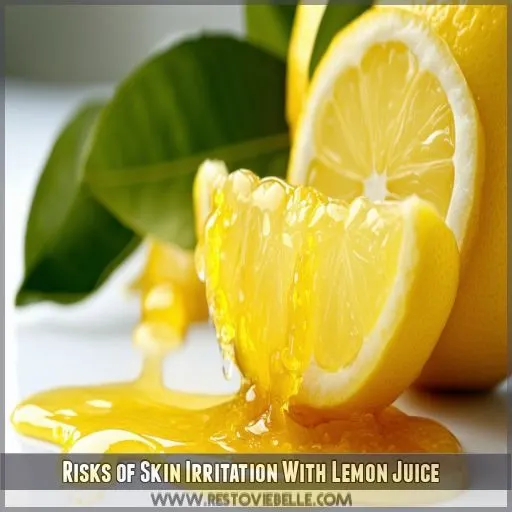This site is supported by our readers. We may earn a commission, at no cost to you, if you purchase through links.
 Do you know that more than 50 million Americans suffer from acne annually? If you are one of them, you must have wondered at one point: does lemon juice help clogged pores? This article gets into the science-backed answers you’re looking for.
Do you know that more than 50 million Americans suffer from acne annually? If you are one of them, you must have wondered at one point: does lemon juice help clogged pores? This article gets into the science-backed answers you’re looking for.
We will discuss lemon juice’s probable benefits for your skin, from its exfoliating properties to its antibacterial effects. That’s how you will learn how this natural fix could help unclog pores, and very important precautions that need to be taken.
Be prepared to debunk this very popular skincare hack.
Table Of Contents
- Key Takeaways
- Does Lemon Juice Help Clogged Pores?
- Lemon Juice for Clogged Pores
- Lemon Juice and Skin Lightening
- Lemon Juice for Dandruff and Psoriasis
- Lemon Juice and Collagen Production
- Risks of Skin Irritation With Lemon Juice
- Lemon Juice for Blackhead Removal
- Frequently Asked Questions (FAQs)
- Does lemon juice unclog pores?
- How do you use lemon juice for open pores?
- Is it safe to rub lemon juice on your face?
- Can lemon juice remove blackheads?
- How long does lemon juice take to unclog pores?
- Can lemon juice be combined with other ingredients?
- Is bottled lemon juice as effective as fresh?
- How often should lemon juice be applied weekly?
- Can lemon juice worsen existing acne or breakouts?
- Conclusion
Key Takeaways
- Lemon juice might be nature’s skincare Swiss Army knife, but it’s more of a double-edged sword when it comes to clogged pores. Sure, its citric acid can exfoliate and unclog, but it’s like inviting a bull into a china shop – it might do the job, but at what cost?
- While lemon’s antibacterial properties sound like they’d send acne-causing bacteria packing, it’s not all sunshine and rainbows. This citrusy superhero can quickly turn into a villain, irritating sensitive skin faster than you can say "pucker up!"
- Thinking of using lemon juice to fade those pesky acne scars or age spots? Hold your horses! It might work, but you could end up trading one problem for another. chemical leukoderma and increased sun sensitivity? No thanks, I’ll pass on that lemon-flavored Russian roulette.
- At the end of the day, using lemon juice on your skin is like trying to fix a watch with a sledgehammer. Sure, it might work, but there are gentler, dermatologist-approved options that won’t leave your face feeling like it’s been through the wringer. When life gives you lemons, maybe just make lemonade instead of a face mask!
Does Lemon Juice Help Clogged Pores?
Yes, lemon juice can definitely clear clogged pores with its natural citric acid, which exfoliates by breaking down dead skin cells and oil excesses that block the pores. Moreover, lemon juice contains antibacterial agents fighting against bacteria causing acne and further minimizing blocked pores.
However, lemon juice should be used cautiously because it might cause skin irritation, increased sun susceptibility, and possible discoloration. Though this might just suit some people, it definitely does not suit everybody, especially those with sensitive skin.
Always dilute lemon juice for best results and apply it in moderation. There’s more to uncover with this citrusy solution for your skincare woes.
Lemon Juice for Clogged Pores
Lemon juice’s citric acid can help exfoliate dead skin cells and unclog pores, potentially reducing acne. Its antibacterial properties may also combat acne-causing bacteria, making it a natural option for addressing clogged pores and improving skin texture.
Citric Acid Exfoliation
Citric acid in lemon juice can help unclog pores through exfoliation. Here’s how it works:
- Breaks down dead skin cells
- Dissolves excess oil
- Helps remove debris from pores
- Promotes skin cell turnover
However, be cautious. The high citric acid concentration and low pH can disrupt your skin’s balance, potentially causing irritation. While it may inhibit bacterial growth, consider gentler alternative exfoliators to avoid inflammatory responses. Always dilute lemon juice before applying to your skin.
Antibacterial Properties
Beyond exfoliation, lemon juice’s antibacterial properties might help combat acne-causing bacteria. Its high acidity creates an inhospitable environment for microbes, potentially reducing breakouts.
However, caution is key. While lemon juice may have anti-inflammatory effects, it can also irritate sensitive skin or worsen conditions like rosacea.
Lemon Juice and Skin Lightening
Lemon juice’s skin-lightening properties may help fade age spots, acne scars, and facial hair. Its high vitamin C content can inhibit melanin production, potentially leading to a more even skin tone over time.
Age Spots
You may have heard that lemon juice will lighten age spots, but is it true?
Well, a little vitamin C and antimicrobial actions of lemons may work, but it can’t be all sunshine. Beware of chemical leukoderma and increased sun sensitivity. Always patch test first.
Lemon juice might deal with hyperpigmentation; however, it’s a double-edged sword.
For safer options, consult a dermatologist who can guide you through evidence-backed treatments personalized according to your skin type.
Acne Scars
While lemon juice may help with age spots, it’s also touted for acne scarring. The citric acid acts as a natural exfoliant, potentially reducing the appearance of scars. Here’s how it might work:
- Exfoliates dead skin cells
- Promotes increased collagen production
- Reduces inflammation associated with acne
- Acts as a spot treatment for targeted areas
However, be cautious. Essential oils or other acne treatments might be gentler alternatives. Always patch test before applying lemon juice to your face.
Facial Hair
You’ve probably heard that lemon juice can lighten facial hair, but does it really work?
While lemon’s natural bleaching properties might subtly lighten hair, it’s not a reliable hair removal method.
Be cautious – lemon can cause skin depigmentation and increase sun sensitivity.
If you’re looking to manage facial hair, consider safer alternatives.
Lemon Juice for Dandruff and Psoriasis
Lemon juice may help with dandruff and psoriasis due to its natural exfoliating properties and ability to reduce skin patches. By applying it, you could remove dead skin cells and alleviate some symptoms of these conditions.
Exfoliating Properties
Lemon juice’s exfoliating properties can be a game-changer for dandruff and psoriasis. Its citric acid concentration works wonders, sloughing off dead skin cells and unclogging pores. But remember, this home remedy isn’t without risks. Here’s what you need to know:
- Helps exfoliate acne-prone skin
- Boasts antibacterial properties
- Offers anti-inflammatory benefits
- May reduce scalp flaking
- Can be harsh if not diluted properly
Always prioritize safety when using lemon juice on your skin or scalp.
Skin Patch Reduction
Beyond exfoliation, lemon juice’s anti-inflammatory effects can help reduce skin patches associated with dandruff and psoriasis. It’s like a natural reset button for your scalp and skin.
The citric acid in lemon juice may also combat fungal infections, a common culprit behind dandruff.
As a bonus, you’ll see wrinkle reduction and skin smoothing benefits, while the pore-cleansing action keeps your complexion fresh and clear.
Lemon Juice and Collagen Production
You may have heard that lemon juice can increase collagen production in your skin, but how much truth is in it? Lemon juice is full of antioxidants, the most prominent being vitamin C. Vitamin C plays a huge role in the synthesis of collagen molecules. So, these antioxidants act against free radicals to protect your skin and consequently help in slowing down the aging process.
While lemon juice itself won’t rub out the wrinkles, it can keep your skin firm and elastic for long.
A word of caution, though: using lemon juice on your skin is very risky. It may cause hyperpigmentation and even phytophotodermatitis—a condition that makes one’s skin oversensitive to sunlight.
If you really want to power up on collagen using vitamin C, it’s much safer to use specially formulated skincare products that contain stabilized forms of this nutrient.
Risks of Skin Irritation With Lemon Juice
There might be some basis for loosening clogged pores by using lemon juice, but one also has to consider the at-risk situation of skin irritation. Dryness, redness, and increased sun sensitivity can result from putting lemon juice on your skin, so caution should be applied.
Dryness and Redness
While lemon juice can help with clogged pores, it’s not all sunshine and roses. You might find yourself dealing with some unwanted side effects:
- Skin peeling and redness, leaving you feeling like a snake shedding its skin
- Allergic reactions that’ll make you wish you’d stuck to your regular skincare routine
- Phytophotodermatitis, a fancy term for a not-so-fancy rash
Chemical leukoderma’s no picnic either, potentially leaving you with white spots. Remember, when life gives you lemons, think twice before putting them on your face!
Increased Sensitivity to Sun
By putting lemon juice on your skin, you’re really hypersensitizing it to the sun. Citric acid from lemons can be responsible for easier and increased sun damage, leading to irritation and hyperpigmentation on human skin.
It’s thus important that you apply some form of protection after treating your skin with lemon juice. Better still, avoid exposure to the sun right after application to prevent any possible issues with the skin.
Lemon Juice for Blackhead Removal
Chances are you’ve heard the whispers that lemon juice is kind of like a fairy godmother to blackheads. But does that elixir truly live up to the buzz? Squeeze out these facts:
Lemon’s natural acidity can help clean out pores, which may loosen those more hardened blackheads in turn. Mix one part lemon juice with another part water for a gentle lemon mask. Apply to trouble spots, let it sit there for some minutes, then rinse.
This home remedy can also aid in skin lightening to help you sport that youthful glow. But, once again, let’s not jump ahead to magic blackhead extraction or anything. Lemon juice is more like the sidekick in your skincare routine.
Keep in mind that while lemon can freshen up, it’s not for everyone. If you have overly sensitive skin, you may want to use some of the milder alternatives. Always patch test first!
Frequently Asked Questions (FAQs)
Does lemon juice unclog pores?
While lemon juice can exfoliate and potentially clear pores due to its citric acid content, it’s not recommended for skincare. The high acidity can irritate your skin and increase sun sensitivity. Safer, dermatologist-approved alternatives are better for unclogging pores.
How do you use lemon juice for open pores?
To use lemon juice for open pores, dilute it with water and apply gently using a cotton ball. Don’t leave it on for long, and always follow up with sunscreen. Remember, it’s not a dermatologist-recommended treatment.
Is it safe to rub lemon juice on your face?
Rubbing pure lemon juice on your face isn’t recommended. It’s highly acidic and can irritate your skin, causing redness and sensitivity. If you’re keen to try, dilute it with water and do a patch test first.
Can lemon juice remove blackheads?
Like Hercules tackling the Augean stables, you might think lemon juice can vanquish blackheads. While it’s acidic and may exfoliate, it’s not recommended. You’re better off using proven treatments like salicylic acid or benzoyl peroxide for safer results.
How long does lemon juice take to unclog pores?
While lemon juice might help in unclogging pores, it doesn’t work like magic overnight. You’ll have to apply it continuously for at least a few weeks and then see the difference. Keep in mind once again that it’s very important to dilute it and use sunscreen!
Can lemon juice be combined with other ingredients?
You might wonder if mixing lemon juice with other ingredients boosts its pore-clearing power. While it’s possible, caution’s key. Honey or yogurt could soften effects, but always patch test and dilute. Don’t mix with harsh chemicals or exfoliants.
Is bottled lemon juice as effective as fresh?
Fresh lemon juice is more potent than bottled for skincare. You’ll get higher concentrations of vitamin C and citric acid from freshly squeezed lemons. However, bottled juice can still offer some benefits if it’s pure and not from concentrate.
How often should lemon juice be applied weekly?
Hey, don’t be such a square! You shouldn’t apply lemon juice more than twice weekly. It’s potent stuff. Start with once a week, diluted. If your skin tolerates it well, you can increase to twice weekly. Always protect your skin afterwards.
Can lemon juice worsen existing acne or breakouts?
Yes, lemon juice can worsen acne. Its high acidity may irritate your skin, causing inflammation and redness. It might also disrupt your skin’s natural pH balance, leading to increased oil production and potentially more breakouts.
Conclusion
The saying goes, "an ounce of prevention is worth a pound of cure" when it comes to taking care of your skin.
Although lemon juice has some exfoliating and antibacterial properties, it’s in no way the magic bullet for unclogging pores or getting rid of blackheads. Very small benefits count against possible risks in using lemon juice on clogged pores.
So essentially, if you’re wondering, "Does lemon juice help clogged pores?" It might, but there are safer alternatives.
Consult with a dermatologist to know the best advice for you in relation to treating clogged pores and keeping your skin healthy.












